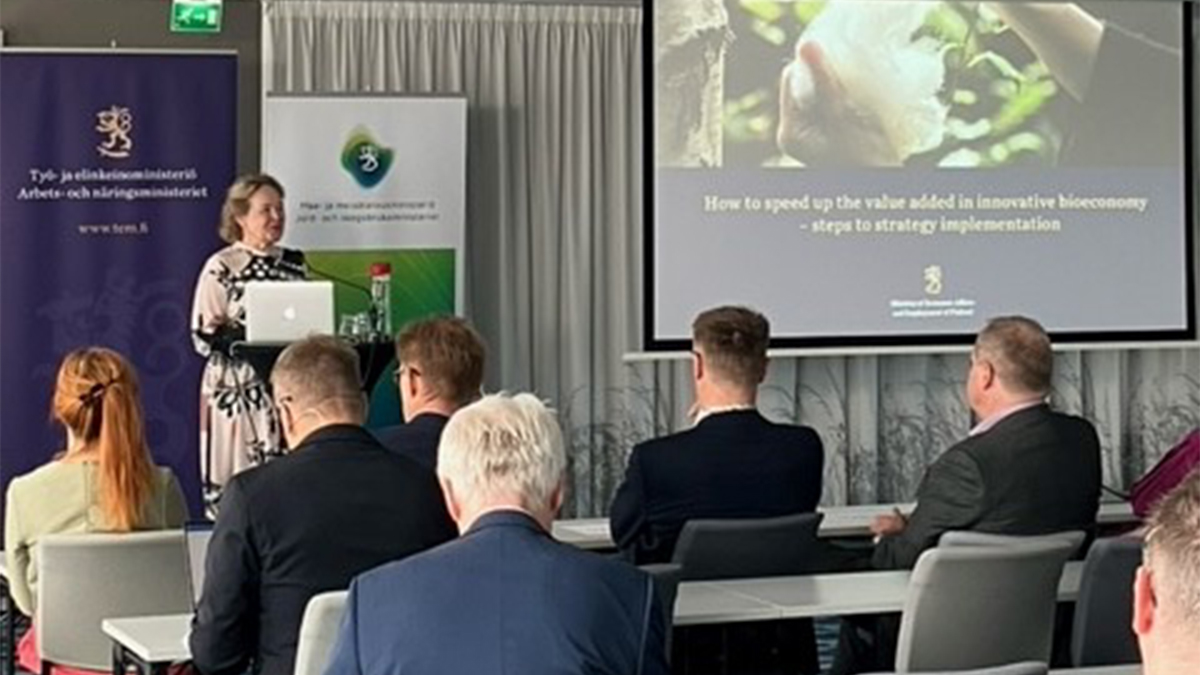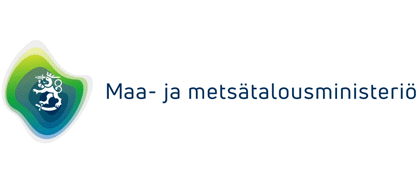Speech by Jaana Husu-Kallio at the Bioeconomy seminar 6.6.2023 in Helsinki

Permanent secretary Jaana Husu-Kallio gave the opening speech at the Bioeconomy seminar: How to speed up the value added in innovative bioeconomy – steps to strategy implementation, held on the June 6th 2023 in Helsinki.
Dear participants/dear colleagues,
Good morning everyone. It is lovely to see so many of you here at the Scandic Park hotel, and I would like to also give a warm welcome to everyone joining us online. I am delighted that Deputy Director General Ms Magda KOPCZYNSKA from the Directorate General for Agriculture and Rural development was able to join us here today. Welcome, Magda!
It is my great pleasure to open today’s seminar entitled “How to speed up the value added in innovative bioeconomy – steps to strategy implementation”. The Ministry of Agriculture and Forestry is organising this seminar together with the Ministry of Economic Affairs and Employment.
Finland published its updated Bioeconomy Strategy just over a year ago. The ambitious objective of the updated strategy is to double the value added of the Finnish bioeconomy by 2035 as compared to 2019. This will only be possible if we can raise the value in the different parts of value chains and across Finland, at both the local and regional levels.
• In my view, we must guide bioeconomy policy in a way that offers incentives for both the production of raw materials and the processing and consumption of bio-based products and services with higher value added.
• The problem today is that policies tend to focus on and encourage action in just one limited part of the value chain. For example, the impacts of policies cannot be examined with respect to the land use sector and primary production alone. We have to consider impacts throughout the value chain, including production and consumption. This way, we can find the most sustainable solution.
Finland’s updated Bioeconomy Strategy has been designed so that different actors – such as ministries, regions, universities and educational institutions, primary producers and companies – can all be involved in its implementation, as they were in the drafting process. This is very important, because the Bioeconomy Strategy is not just a tool for administrators.
As the implementation of the updated Bioeconomy Strategy is only just beginning, I would like to highlight a few key policy decisions.
First, a new Finnish Forest Bioeconomy Science Panel was established in the beginning of this year. Its goal is to strengthen science-based decision-making and support the development of innovations in¬ the forest sector. With so much information out there, it is useful to have an independent scientific body that interprets that information and strives to find the most sustainable solutions. We will hear more about the work of the panel later this morning.
Second, regional bioeconomy action plans are an important tool guiding us towards higher added value in the bioeconomy. They allow regions to build their actions based on their local strengths. Today, we will also hear more about the experiences of the regions in increasing the added value of the bioeconomy.
In this regard, I would like to give special thanks to the Commission for their work on Innovation Valleys, especially for developing the Innovation Valley for Bioeconomy and Food Systems. We look forward to finding Finnish regions that are interested in joining this innovation network.
Finally, in late 2022, we approved a new National Forest Strategy that is complementary to the Bioeconomy Strategy. The Forest Strategy aims to implement a responsible economy of wellbeing and places a particular focus on self-sufficiency, security of supply and climate, and on the biodiversity and vitality of forests. The renewal of forest-based business and activities is at the heart of the strategy.
We look forward to seeing forest industry recognised as a stronger enabler of the green transition in the Commission’s work. In this context, we see a great deal of possibilities for Europe.
Finland’s CAP plan for 2023–2027 also plays an important role in advancing the goals of the Bioeconomy Strategy. Farmers, forest owners and rural non-agricultural companies each have their role in the value chain. It is important that the future CAP after 2027 will make tools available to bioeconomy actors in rural areas, where bio-based resources mainly come from. By actors I mean not only farms but also rural non-agricultural companies.
There is one basic thing about the bioeconomy that bears repeating – successful development of the bioeconomy depends on cooperation. We have been very pleased to hear that both of our closest neighbours, Estonia and Sweden, are preparing their own bioeconomy strategies and roadmaps. We look forward to deepening our cooperation with them. (Virosta edustaja paikalla). In my view, the development of regional bioeconomies is an area of cooperation that we should look into more closely together with our neighbours.
Finland is currently putting together a new Government. I am confident that we will continue to recognise the importance of the bioeconomy for the national economy, wellbeing and resilience in the future. I am sure that we will continue to develop and deploy innovative products and services based on different bio-resources.
This brings me to my last point, which is that developments in the bioeconomy and its operating environment are occurring at a very rapid pace. We must bear in mind, for example, that the introduction of biogenic carbon recovery by 2030 is likely to change our views on climate policy. We must plan future-proof policies that do not hinder technological development. In the future, bioeconomy policies will be even more strongly connected to industrial policies than they are at present, and we hope this is also recognised at the EU level. I am convinced that this is necessary in order to deliver more sustainable added value for the European bioeconomy.
Now, it is my pleasure to wish you a very successful and insightful seminar this morning. With that, I give the floor over to our moderator. Thank you!



